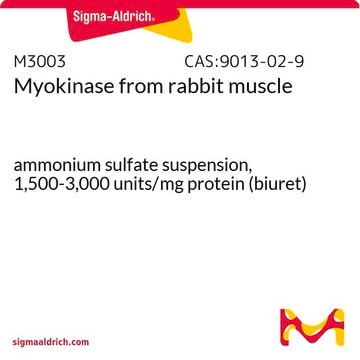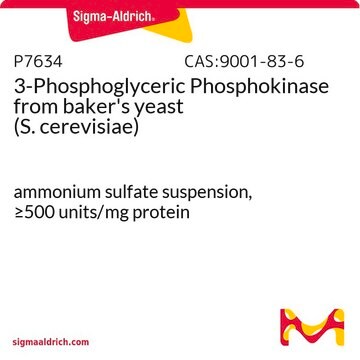N2635
Nucleoside 5′-Diphosphate Kinase from bovine liver
buffered aqueous glycerol solution, ≥1,000 units/mg protein (biuret)
Sinónimos:
NDK, UDPkinase, nonmetastatic23(NM23), uridine diphosphate kinase, ATP:nucleoside diphosphate phosphotransferase, NDPK
About This Item
Productos recomendados
biological source
bovine liver
Quality Level
form
buffered aqueous glycerol solution
specific activity
≥1,000 units/mg protein (biuret)
storage condition
(Tightly closed)
technique(s)
activity assay: suitable
foreign activity
lactic dehydrogenase, myokinase, β-NADH oxidase, nucleoside monophosphokinase and ATPase ≤0.1%
storage temp.
2-8°C
General description
Nucleoside 5′-Diphosphate Kinase (NDK) is a ubiquitous housekeeping enzyme. Nucleoside Diphosphate Kinase exists in two isoforms in eukaryotic cells, NDK-A and NDK-B. These enzymes are found expressed both in the mitochondria and the cytoplasm.
Application
- nucleoside diphosphate kinase (NDPK) assays
- coupled NDPK-luciferase assay to determine the amounts of Ras-bound guanosine triphosphate (GTP)
- non-metastatic protein 23 (NM23) growth stimulation assay
- in a study to assess inhibition of type I Fc epsilon receptor mediated Ca2+ influx and mediator secretion in rat mucosal mast cells
- in a study to investigate protein synthesis in rabbit reticulocytes
Biochem/physiol Actions
Unit Definition
Antibody
enzyme
related product
substrate
Storage Class
10 - Combustible liquids
wgk_germany
WGK 3
flash_point_f
Not applicable
flash_point_c
Not applicable
Elija entre una de las versiones más recientes:
Certificados de análisis (COA)
¿No ve la versión correcta?
Si necesita una versión concreta, puede buscar un certificado específico por el número de lote.
¿Ya tiene este producto?
Encuentre la documentación para los productos que ha comprado recientemente en la Biblioteca de documentos.
Los clientes también vieron
Nuestro equipo de científicos tiene experiencia en todas las áreas de investigación: Ciencias de la vida, Ciencia de los materiales, Síntesis química, Cromatografía, Analítica y muchas otras.
Póngase en contacto con el Servicio técnico









